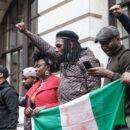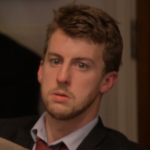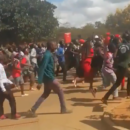Self-Protection versus Helping Survivors
On substance, much of what Darfur and the Crime of Genocide contains has been available from Joyce Apsel (ed.) Darfur: Genocide before Our Eyes published by the Institute for the Study of Genocide in New York in 2005. The “collective action theory of genocide”, pp. 162 ff, is familiar from Helen Fein and the more recent writings on mass violence by Benjamin Valentino, Michael Mann, Paul Collier and many others. I won’t comment on these two topics.

There are three items worth debate. 1. Genocide versus mass violence. 2. Prosecution of genocide and war crimes. 3. Deterrence and prevention versus prosecution after the fact.
1. Whatever label one attaches to Darfur and similar events, if people are killed and expelled from their homes on a large scale, there ought to be some political, legal and military mechanisms for putting a stop to it and accountability for these crimes. To me it does not matter if a state does it to a people, or a people to another people, or whether the motivation is racial or ethnic hostility and fears, or political differences. I prefer the category “mass violence” for the simple reason that if genocide is the focus, one gets bogged down in controversies about whether the event in question meets the legal definition in the Convention, or some other legal precedent. Frankly, when it comes to responses to mass violence, we should not spend our energies on whether the Hutu and Tutsi are one ethnic group or two, or the people with African and Arab identities in Darfur are the same or different people, etc. I find it more useful to think of the collective actors as state agents, soldiers, paramilitaries, insurgents and non-combatants””civilians, etc. and the actions they do to one another should be differentiated by scale (isolated incidents, rapes, massacres, mass violence and killing) and type of victimization (expulsion, killing, destruction of habitat, etc). At bottom, whether or not the genocide label is used, the humanitarian NGOs and other stakeholders will have to deal with these specific groups of victims and perpetrators and these specific actions and their consequences. [Scholars, historians and ethnographers of course are welcome to debate the Hutu-Tutsi etc origins and labeling and its colonial or other roots and its manifestations in contemporary conflicts.] In this connection, I want to call your attention to the Online Encyclopedia of Mass Violence [www.massviolence.org] directed by Jacques Semelin at Sciences Po in Paris.
2. John Hagan and Wenona Rymond-Richmond in chapter 5 “Eyewitnessing Genocide” describe the Sudan-Darfur chain of command and eyewitness accounts of Darfur crimes and massacres. This type of information does enter the prosecution case but is not sufficient to convict offenders in an international trial. From news media accounts, eyewitnesses that have survived, bodies and mass graves and villages destroyed, we know pretty much what has happened soon after it has happened. The prosecution however has to prove guilt beyond reasonable doubt for specific crimes traced to specific offenders, for command responsibility, and/or for joint criminal enterprise. From my experience as expert witness at the Seselj trial (still going on) at the ICTY in The Hague and examining the transcripts in similar trials, I learned that proving guilt beyond reasonable doubt is difficult: paper and electronic trail does not exist, or has been destroyed, or can not be accessed; defense witnesses are intimidated (or worse); comrades and peers do not testify against one another, in fact they perjure themselves and cover one another with phony alibis; the memory of witnesses after some years is not that good and the defense can discredit a lot of it; much witnessing occurs in the “fog” of civil war and ethnic cleansing and is not precise; the defense argues that targets destroyed are dual use, not non-combatant, and thus not a war crime, and it is difficult to prove otherwise, and so it goes. It is easier to prove command responsibility against top military than against top political leaders, and it is easier to convict lower rank offenders than higher rank offenders for specific war crimes and crimes against humanity. Joint criminal enterprise turns out to be crucial for the prosecution. International court prosecutions are hugely expensive and take years. On international justice issues, there is a lot to discuss beyond Hagan and Rymond-Richmond.
3. Hagan and Rymond-Richmond make a case for international action in Darfur beyond humanitarian aid, such as bringing the top Sudan leaders to justice, which is straightforward to advocate, but they do not discuss the specific international mechanisms, or their lack, for deterring and preventing and stopping mass violence in progress (ranging from diplomacy, sanctions regimes, peace intervention by the UN and by other states, to a proposed Rapid Deployment Force under the authority of the UN Security Council, and much else). That is a big topic in international relations and political science, and I won’t go into it. I have to point out that Hagan and Rymond-Richmond do not factor in the role of petroleum, stakeholders such as China and Chad, and other aspects of international relations that complicate action on Darfur. Given the disarray of the international response in Darfur, not to mention other interventions, I suggest another mode of deterrence and prevention which in some instances may work (though perhaps too late for Darfur) but has not been tried.
The victims have to be armed so that they can defend themselves against aggressors. The precedent is a “˜home guard’ created by the Brits in the Malaya insurgency, but it would be initiated under UN authority and supervised by a UN connected peace keeping force. The idea is to distribute and train villagers with defensive weapons and organize a village militia that can be deployed against paramilitaries, insurgents, soldiers, to defend itself. In the eventuality of aggressors showing up with aircraft, helicopters, armored vehicles and other heavy weapons, the UN would have to impose and enforce a no fly zone and ban and target heavy weapons in the area concerned. There are many details that would have to be worked out and many objections can be made. I look forward to a discussion of this proposal, which seems to me is better than what the international community has to offer victims, as in Darfur: death, rape, devastation, forced migration and living in refugee camps for years.







More guns are the last thing Darfur – and the rest of Sudan – needs. Isn’t this advocating a return to the dark days when Africa and its’ people and leaders were pawns in the Cold War of yester year?